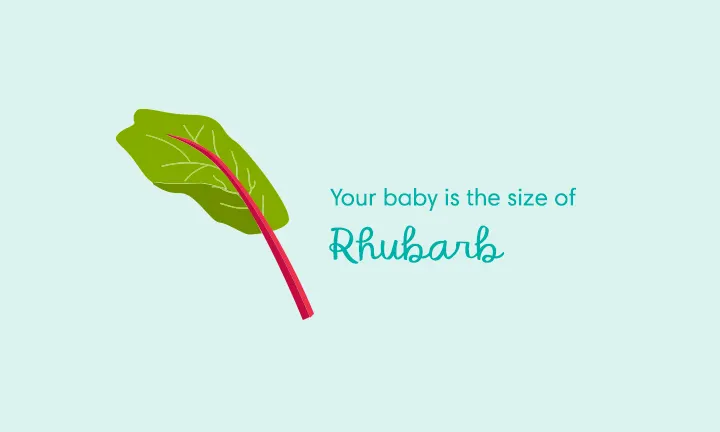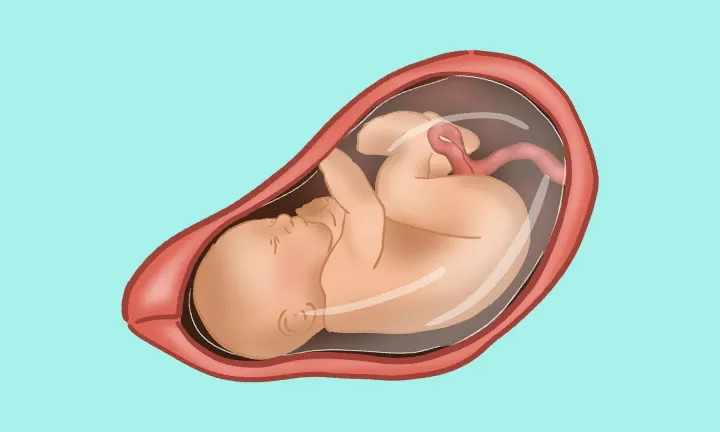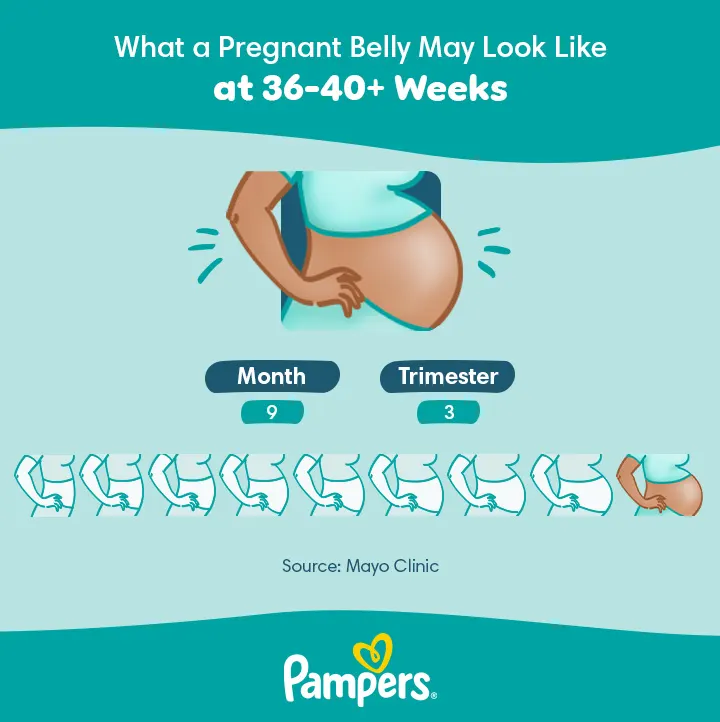38 weeks pregnant
Congratulations on reaching 38 weeks pregnant! You're in the home stretch now, as your body prepares for labour. This week, we'll explore what happens at 38 weeks pregnant, the size of your baby and bump and some common symptoms you may experience. Remember, every pregnancy journey is unique and wonderful in its own way. So, keep reading for more information to help guide you through this period and some helpful tips.
Highlights at 38 Weeks Pregnant
There’s a lot to take in throughout this pregnancy journey, so here’s a quick summary of this week:
Your baby is about the size of a stick of rhubarb right now.
At 38 weeks, they may be practising little facial expressions.
Keep tracking your little one’s movements and get to know their unique pattern to help you spot any changes.
Get ready for your big day by selecting your birthing partner, being aware of the signs of labour, and knowing when to go to the hospital.
Have you picked the perfect baby name yet? If not, you might like to try our Baby Name Generator, with so many great names to choose from:
BABY NAME GENERATOR TOOL

Baby name generator
By gender:
By theme:
Your Baby’s Development at 38 Weeks Pregnant
Your little one could arrive any time now. This is because only 1 in 20 babies are actually born precisely on their due date. In most cases, labour starts any time between 38 weeks and 42 weeks of pregnancy, and twins or triplets may arrive a little earlier than this. Because you never know when your little one might arrive, it’s a good idea to have your hospital bag packed and ready to go. On that note, let’s take a look at your baby’s developments this week:
It might surprise you to learn that your little one is busy practising facial expressions. At this very moment, they might be smiling, frowning or even silently going through the motions of crying.
This face-pulling is still just random, and not tied to any specific emotion like sadness or happiness, but it’s amazing to think that your little one is already preparing to melt your heart with that first smile!
Your baby continues to gain weight and the lungs and brain keep on maturing at 38 weeks pregnant and beyond.
In fact, if you’re having a planned caesarean section, it may not be scheduled until you’re at least 39 weeks pregnant. This is to make sure your little one’s lungs are as well-developed as possible.
Keep in mind that this isn’t always the case though: In certain cases, the doctor may recommend an earlier caesarean section if this is considered the safest option based on a thorough assessment of all the risks and health benefits.
At 38 weeks pregnant, you’re likely familiar with your little one’s patterns of movement and general level of activity; however, a kick counting app or chart can give you a useful point of reference if you’re still a little unsure.
The movements should continue right up until birth. If you think your baby is moving less than usual, it’s important to let your midwife or doctor know immediately.
Less movement could be a sign of an infection or other problem, and the sooner it’s checked out the better. This way, your little one will be able to get the right care if necessary.
38 Weeks Pregnant in Months
How many months is 38 weeks pregnant? Since pregnancy doesn’t divide neatly into months, the answers can vary. However, at 38 weeks pregnant, you’re generally considered 9 or 10 months pregnant.
Your Baby’s Size at 38 Weeks Pregnant
Now that you’re 38 weeks pregnant, your baby is about the size of a rhubarb, measuring close to 49.8 centimetres from head to heel, and weighing in at around 3 kilograms (6.6 pounds).
Your Baby: What Does 38 Weeks Pregnant Look Like?
This visual can give you a general idea of how your baby may be positioned at 38 weeks:
Your Body at 38 Weeks Pregnant
At 38 weeks pregnant, instead of asking how many months pregnant you are, people that you meet could now be telling you that you look ready to give birth any moment.
You may indeed be feeling pretty large right now, but that’s hardly surprising. On average, pregnant people gain between 10 and 12.5 kilograms (22 and 27 pounds) throughout a pregnancy, although this figure can vary a great deal depending on your starting weight and many other factors.
Most of these extra kilograms result from the weight of your foetus, the placenta and amniotic fluid, but your own body is also storing fat for breastmilk production after your baby is born.
Much of this extra fat is stored in your breasts and bottom, so you may be noticing some expansion in these areas in particular.
Keep to your healthy diet and remain as active as you can. If you’re finding your usual exercise routine more of an effort due to your changed body shape and the extra weight, consider switching to more gentle activities like walking.
Swimming or ‘aquanatal’ sessions are also a great way of staying in shape during the third trimester, as the water can support your bump and give you a feeling of weightlessness. Remember, at 38 weeks pregnant or beyond, if you have any questions about what exercises are safe to do or any other questions about your health or pregnancy weight gain, ask your doctor or midwife for personalised advice.
Your Symptoms at 38 Weeks Pregnant
Here are some of the symptoms you may be experiencing at 38 weeks pregnant:
Signs of labour. At 38 weeks pregnant, suddenly feeling sick could mean it’s nearly time for your little one to be born, especially if it’s accompanied by other signs of labour. A bout of diarrhoea might be another possible tell-tale sign. Lower back pain is a common complaint among pregnant people at all stages of pregnancy, but an unusual or constant backache might also signal the early stages of childbirth. Some of the signs of labour are more obvious, however. A gooey, pink or blood-streaked discharge could be the mucus plug coming away – a sign that your cervix may be starting to soften and open up in readiness for labour. If you experience period-like pains and cramping or regular or painful contractions, or if you notice your waters breaking, call your midwife or doctor to let them know what you are experiencing. You can also call your midwife or doctor if you’re in any doubt about symptoms.
Braxton Hicks contractions. You may already have felt these seemingly random sensations of a tightening around the stomach earlier on in your pregnancy. Braxton Hicks contractions are your body’s way of getting into practice for the real thing. At 38 weeks, you might be wondering if you’ll be able to tell them apart from true labour contractions. In a nutshell, the two main giveaways are regularity, and severity: True labour contractions come at regular intervals, and they tend to get closer together and stronger as time progresses. Braxton Hicks contractions, on the other hand, don’t follow any noticeable pattern, and although they may feel strange or uncomfortable, they aren’t painful. Once you start feeling true labour contractions, it may help to count or time them so you know when it’s time to leave for the hospital or birthing centre. Your midwife or doctor will be able to tell you how to do this.
Frequent urination. The weight of your growing baby and uterus, not to mention the amniotic fluid and placenta, may be putting extra pressure on your bladder, and this can give you the urge to pee more often. To compound things (literally), at 38 weeks pregnant your little one may have recently moved further down into your pelvis in readiness for delivery, resulting in even more pressure down there. (If this hasn’t already happened, it may occur at any time between now and the start of labour.) Drinking less isn’t an option, because it’s important to stay hydrated. Cutting down on caffeine-based drinks can help though, because these can stimulate the urge to urinate. Your best bet is to keep drinking plenty of water, but plan ahead so that you’re near a loo whenever possible.
Swollen ankles and feet. At 38 weeks pregnant your growing uterus and baby may be putting pressure on blood vessels, affecting the flow of blood in your legs. This can contribute to swelling in your ankles and feet, as fluid builds up in these extremities throughout the day. To help, try to avoid standing for long periods at a time; wear loose, comfortable socks and shoes; put your feet up whenever you can; and drink plenty of water. It may seem counterintuitive, but staying hydrated actually helps flush the retained fluids out of your system.
What Size Is a Pregnant Belly at 38 Weeks?
You’re nearly at the end of your pregnancy, and your uterus will finish expanding this month. As we mentioned in the sections above, your bump may feel pretty large by now, but of course, it can vary for each individual and from pregnancy to pregnancy.
What Does 38 Weeks Pregnant Look Like?
Here’s a general idea of how your belly might look like at 38 weeks pregnant:
Things to Consider at 38 Weeks Pregnant
Here are a few helpful things to consider as your due date approaches:
At 38 weeks pregnant, you may have another antenatal appointment coming up. These check-ups are usually scheduled for every two weeks at this stage of your pregnancy. At these appointments, your doctor or midwife will take measurements to estimate the size of your uterus. They’ll also check your blood pressure and test a sample of your urine for protein, to make sure you’re not showing any signs of pre-eclampsia, a rare high blood pressure condition that can be dangerous if it’s not detected in good time. You may also be given information about what happens if your pregnancy goes beyond 41 weeks.
If you’re expecting to give birth vaginally, have you considered your pain relief options for labour yet? If not, your midwife can fill you in on what’s available to you, and the pros and cons of each method. The range of options may include gas, pain relief injections or an epidural anaesthetic, which is administered into the spine. There’s also a wide range of other comfort measures that can help make your labour and delivery more bearable. Ask your midwife for more information on which of these may be available to you. You might want to include your pain relief preferences in your birth plan, if you have one, but keep in mind that whatever you decide now, you can change your mind about when the time comes. For now, the important thing is to be aware of all the possibilities so you can make informed choices during labour.
You may want to choose a birth partner to be with you throughout your labour and delivery. This might be your partner, a family member, a friend or even a trained professional, like a doula. Your birth partner can support you emotionally and provide encouragement. They can also give practical assistance, for example by timing contractions or offering a soothing massage. If you have a birth plan, talk it through with your birth partner so that they are familiar with your preferences.
If you haven’t got a hospital bag packed and ready to go at 38 weeks pregnant, it really might be a good idea to stock yours up now. Even if you’re planning a home birth, it’s good to have a hospital bag packed, just in case. Use our handy hospital bag checklist to make sure there’s nothing you’ve missed. Keep in mind that your bag should include all the things you’ll need during your hospital stay, as well as the things you’ll need for your little one and your birth partner.
If you’re considering breastfeeding your baby, you might like to research lactation consultants in your area. A lactation consultant can help you get started and help navigate any possible challenges associated with breastfeeding your baby, such as getting the proper latch, how to increase your breastmilk supply or dealing with sore nipples. You may be able to find one doing a simple online search, but your doctor, your midwife, or perhaps a friend who’s used one before may also be able to recommend one.
Consider taking some time this week to read up on what may be in store during the postpartum period. Knowing ahead of time might help you feel more prepared and in control of the changes that may take place in those first weeks and months. We’ve collected some articles here that you may find interesting:
Tip for Partners With your due date approaching, you and your pregnant partner may be in the midst of a busy time preparing for your new arrival. To make the most of this period, do something fun with your partner or something to help you both unwind. A letter to your future newborn to read when they're a teenager, a photo collage of the pregnancy journey, or anything you’re sure will warm your partner’s heart will be perfect. |
Questions for Your Doctor at 38 Weeks Pregnant
Here are some questions you might like to ask your doctor or midwife at 38 weeks:
Is it safe to have sex during the final weeks of my pregnancy?
What is recommended if my baby is in a breech position?
Under what conditions might it be necessary to induce labour?
If I think I’m going into labour, who should I call? Should I call straight away or wait for something specific?
If I’m in labour, at what point should I head to the hospital or birthing centre?
If I’ve had breast implants or other breast surgery, will I still be able to breastfeed my baby?
How soon can I start breastfeeding after giving birth?
If things go well, how soon after I give birth am I likely to be discharged from the hospital?
FAQS AT A GLANCE
Every pregnancy is unique, so at 38 weeks pregnant, there’s no specific way you ‘should’ be feeling. Here are some of the common symptoms that you may experience around this time:
- increased urination
- pelvic pain and pressure
- swollen feet and ankles
- Braxton Hicks contractions
- feeling off-balance.
At 38 weeks pregnant, it’s a good idea to familiarise yourself with the signs of labour so you know when your baby is on their way.
38 Weeks Pregnant: Your Checklist
You might find this little checklist helpful at 38 weeks:
If you haven’t already had it, ask your doctor when you will have the Group B strep test. This routine test checks whether you carry the GBS bacteria so your provider can give you the appropriate course of treatment if the test result is positive and you plan to give birth vaginally.
You may have started getting your hospital bag ready, but there might be a few things you’ll only be able to pack at the last minute because you’re still using them, like your phone charger and toothbrush. Make a list of these items and stick it to the fridge or put it on your hospital bag. That way, you or your partner can throw the last few items in the bag before you leave for the hospital or birthing centre.
If you haven’t done so already, make sure your baby’s car seat is securely installed in your car, so it’s ready to bring your baby home safe and sound.
Take some time to pamper and care for yourself – you may not have this kind of ‘spare time’ for some time once your baby is born. For example, you may like to do things like getting a haircut or going for a pampering pedicure.
How We Wrote This Article The information in this article is based on the expert advice found in trusted medical and government sources, such as the National Health Service (NHS). You can find a full list of sources used for this article below. The content on this page should not replace professional medical advice. Always consult medical professionals for full diagnosis and treatment.
38 weeks pregnant - checklist


